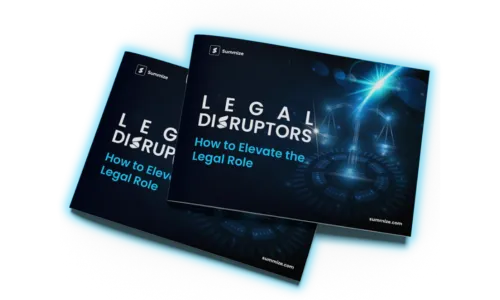Choosing the best CLM: With Brandon Tatum
Brandon Tatum, an accomplished legal expert, shares valuable insights on choosing the best CLM software to match your unique use case.
September 1, 2023
December 11, 2025
In this episode of Summize’s ‘In Conversation With...’ series, Brandon Tatum, music/entertainment executive and international legal counsel, joins us. Brandon has had a successful career working within large law firm practice groups, within in-house legal departments, and as private outside counsel for several high-profile traditional and Web3 music and entertainment companies across the globe.
Brandon has also experienced first-hand the challenges surrounding contracts and the benefits implementing a Contract Lifecycle Management (CLM) solution can bring to an organization. In this episode, Brandon will share how to cut above the noise and choose the right CLM solution for you and his top tips to ensure a successful CLM implementation. Listen to the full conversation below, and keep reading for a short overview.
A career shaped by music and law
Starting as a child recording artist before pursuing law at USC and later LSE, Brandon developed a deep understanding of both the creative and legal sides of the music industry.
His work across law firms, independent labels and global music companies revealed a consistent reality: in-house legal teams are under growing pressure. They’re expected to manage rising workloads, support numerous departments and deliver quickly, all while external counsel costs increase.
Building better collaboration across teams
To ease this strain, Brandon focused on making collaboration smoother and reducing repeat work. Clear templates, defined processes and practical guidance helped business teams progress deals further before sending them to legal. Although some teams initially resisted the structure, they soon realized it helped them move faster and more confidently.
At SoundCloud, Brandon introduced a contract playbook and clause library, giving business users a set of approved clauses, instructions for when legal input was required and ready-made language for routine agreements. This empowered teams such as procurement, finance and operations, and significantly reduced repetitive edits for the legal department.
When contract chaos demands change
Despite these improvements, Brandon found himself overwhelmed by the sheer volume of contract requests arriving through email, Slack, HubSpot, cloud drives and even text messages. Important versions went missing, and renewal dates were at risk of slipping through the cracks. It became clear that a proper contract lifecycle management (CLM) solution was essential.
Mapping what the business really needs
Before choosing a CLM, Brandon mapped out the entire contract lifecycle, from request and drafting to negotiation, storage and renewal. He analyzed who was involved at each stage, where delays happened and which steps mattered most. He then had stakeholders score the importance of each phase and invited them into vendor demos to ensure the system would genuinely support their needs. This early involvement built strong internal support for the project.
The realities of CLM implementation
Once a system was chosen, Brandon discovered that successful implementation required phased rollout, strong vendor support and clear communication. Starting with legal and a core commercial team helped ensure the foundation was right before wider adoption. One of the most time-consuming tasks was gathering existing contracts from scattered locations - inboxes, shared drives and personal folders. Even with AI assistance, cleaning and verifying metadata required careful manual input.
Looking back, Brandon would have mirrored the company’s existing storage structure within the CLM from day one. This helps maintain continuity, improves usability and reduces reliance on any one platform.
A shift in perspective
After years of demanding roles and international travel, Brandon took a sabbatical to reset and reflect. Time with family and his cultural experiences abroad, especially in Japan, reshaped his understanding of collaboration, compromise and negotiation. These insights continue to influence the way he approaches his work today.
Final thoughts
Brandon’s journey illustrates that choosing a CLM is not just a software decision. It’s a company-wide shift that requires stakeholder engagement, realistic planning and a clear understanding of existing challenges. When done thoughtfully, a CLM enables both legal teams and the wider business to operate with greater clarity, confidence and efficiency.
To learn even more about CLM software, the benefits it creates and how to pick the right solution for your business, explore our CLM Hub.
Discover even more!
Explore more about contracting and CLM in our ultimate contract guides








